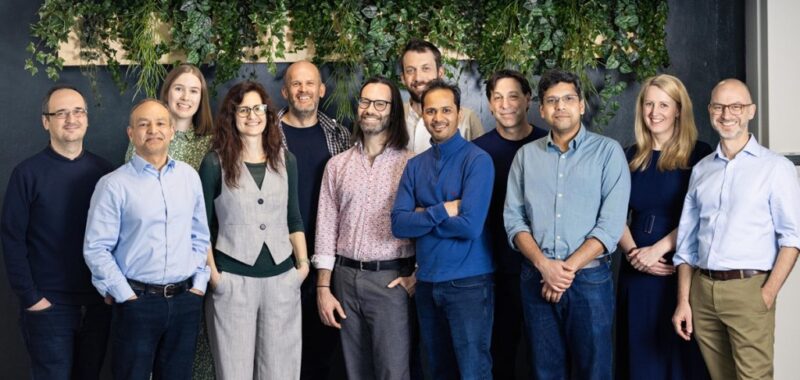Join our daily and weekly newsletters for the latest updates and exclusive content on industry-leading AI coverage. Learn More
Riverlane has raised $75 million in funding to build its quantum error correction technology.
The Series C funding will help the company deliver on its ambitious quantum error correction (QEC) roadmap. If you’re not familiar with why a company can raise money for correcting quantum computing errors, take note.
Microsoft Copilot tells me it’s like a cosmic spellcheck for quantum computers. It’s crucial because quantum computing is like a high-stakes game of Jenga played on a wobbly table. The building blocks are qubits, but they’re divas, Copilot surmises. They’re sensitive to temperature, cosmic rays, microwaves and more. They wobble and jitter and suffer from noise. So you have to have a way to correct errors to take care of the massive advantages of quantum computing.
Demand for quantum error correction technology has grown dramatically over the past year. Driven by a series of technical breakthroughs, improvements in qubit quality and a global shift towards building error-corrected quantum systems, the quantum computing industry is now looking beyond today’s small, error-prone machines to a new generation of “fault-tolerant” quantum computers with integrated QEC technology.

Achieving this requires over a 10,000 times reduction in the system errors that quickly overwhelm all quantum computers today, Riverlane said, and the company believes it has a solution to the problem.
The funding will enable Riverlane to expand operations to meet surging global market demand for QEC technology, with the goal of achieving one million error-free quantum computer operations by 2026.
I asked about the significance of the numerical goal of achieving one million error-free quantum computer operations by 2026.
The company said, “The million error-free operations milestone represents an important technological inflection point whereby a quantum computer can run operations that are impossible for a supercomputer to simulate. Reaching this threshold will enable the exploration of new use cases associated with simulating complex chemical processes. The simulation and design of better chemical catalysts could, for example, enable the production of new battery materials for more efficient clean energy storage and new processes for cleaner fertiliser production.”

Planet First Partners, the European growth equity sustainable investment platform, led the round. Other investors included sustainability venture capital investors ETF Partners and Singapore-based global investor, EDBI.
Existing investors Cambridge Innovation Capital (CIC), Amadeus Capital Partners, the UK’s National Security Strategic Investment Fund (NSSIF), and HPC leader Altair also participated.
“Quantum error correction is the critical enabler for the industry’s next huge wave of progress, from today’s small error-prone machines to large and reliable quantum computers that will start a new age of human progress as significant as the digital revolution,” said Riverlane’s CEO, Steve Brierley, in a statement. “Our partners recognize the value in working with Riverlane to deliver a solution that fits their needs – we are building the right product at the right time to seize this opportunity.”
Riverlane has built the world’s largest dedicated quantum error correction team with close to a hundred interdisciplinary experts working on its core product, Deltaflow. Applicable to quantum computers using all major qubit types, Deltaflow comprises proprietary QEC chips, hardware and software technologies working in unison to correct billions of errors per second.
Today’s best quantum computers can perform only a few hundred quantum operations before failure. Deltaflow will help this increase to millions and, ultimately, trillions of error-free quantum operations. Achieving this scale will unlock transformative applications in industries such as pharmaceuticals, chemicals, material science and transportation.
Nathan Medlock, managing partner at Planet First Partners, said in a statement, “We invest in companies with the potential to have a transformative impact on society and the environment. Riverlane’s focus
on quantum error correction, coupled with its collaboration with quantum computer makers worldwide, can accelerate the global market and enable new quantum computing applications that can substantially contribute to solving social and environmental issues.”

Published earlier this month, Riverlane’s roadmap lays out a development path to one million (Mega) error-free quantum computer operations (QuOps) as early as the end of 2026. The roadmap details a series of product releases, each incorporating significant scientific and technical breakthroughs toward this goal.
The ‘MegaQuOp’ milestone represents an important technological inflection point whereby a quantum computer can run operations that are impossible for a supercomputer to simulate.
Reaching this threshold will enable the exploration of new use cases associated with simulating complex chemical processes. The simulation and design of better chemical catalysts could, for example, enable the production of new battery materials for more efficient clean energy storage and new processes for cleaner fertiliser production.
John Martinis, professor of physics at UC Santa Barbara and former quantum computing lead at Google Quantum AI, said in a statement, “When I led the world’s first successful quantum supremacy experiment in 2019, it helped unlock a collective optimism for what quantum computers can achieve. Five years on, I’m even more optimistic. Building the next generation of devices that live up to the technology’s incredible promise requires a massive step change in scale and reliability, and that requires reliable error correction schemes in quantum hardware.”
Riverlane partners with leading quantum computing companies and government bodies, including Rigetti Computing, Alice & Bob, QuEra Computing, Infleqtion, Atlantic Quantum and national labs such as Oakridge National Lab in the US and the UK’s National Quantum Computing Centre (NǪCC). With this investment, Riverlane plans to expand its operations to meet growing demand from other hardware companies and governments worldwide.
The expansion of Riverlane’s operations will introduce various new opportunities across the company, such as hardware and software engineering, quantum scientist positions and operations roles. Riverlane’s current vacancies can be found here.
Riverlane has 97 employees.
Source link

